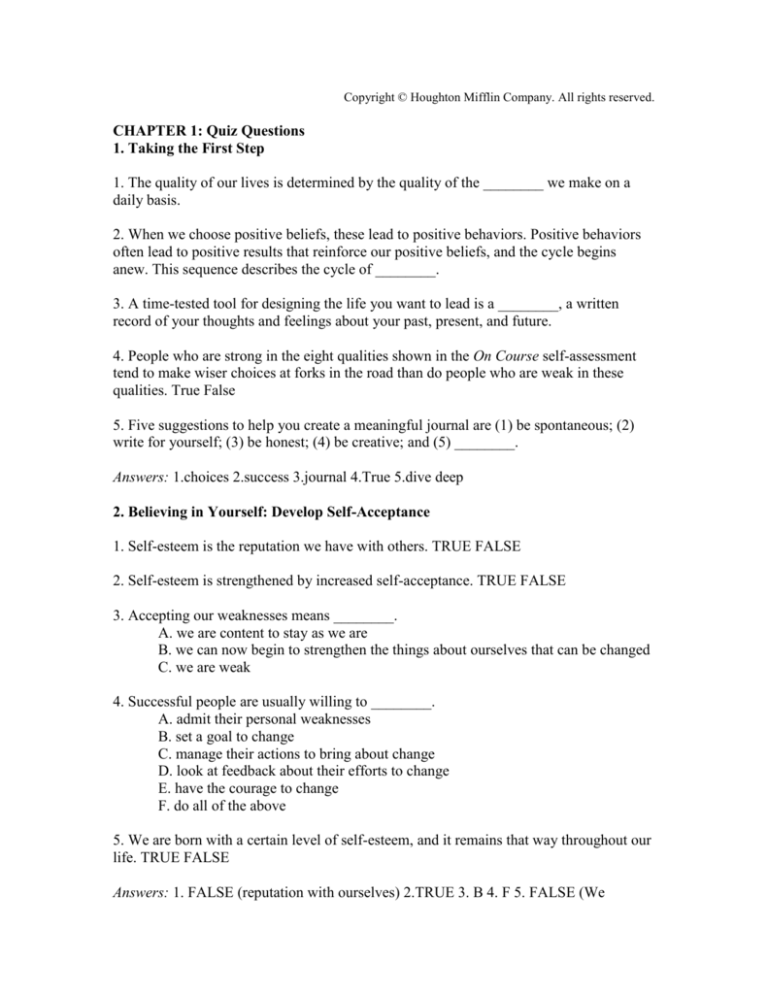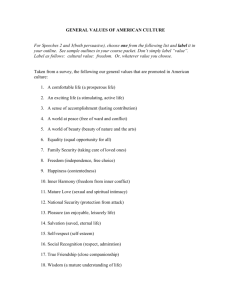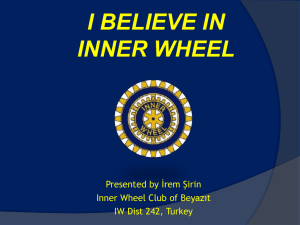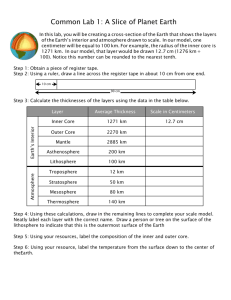
Copyright © Houghton Mifflin Company. All rights reserved.
CHAPTER 1: Quiz Questions
1. Taking the First Step
1. The quality of our lives is determined by the quality of the ________ we make on a
daily basis.
2. When we choose positive beliefs, these lead to positive behaviors. Positive behaviors
often lead to positive results that reinforce our positive beliefs, and the cycle begins
anew. This sequence describes the cycle of ________.
3. A time-tested tool for designing the life you want to lead is a ________, a written
record of your thoughts and feelings about your past, present, and future.
4. People who are strong in the eight qualities shown in the On Course self-assessment
tend to make wiser choices at forks in the road than do people who are weak in these
qualities. True False
5. Five suggestions to help you create a meaningful journal are (1) be spontaneous; (2)
write for yourself; (3) be honest; (4) be creative; and (5) ________.
Answers: 1.choices 2.success 3.journal 4.True 5.dive deep
2. Believing in Yourself: Develop Self-Acceptance
1. Self-esteem is the reputation we have with others. TRUE FALSE
2. Self-esteem is strengthened by increased self-acceptance. TRUE FALSE
3. Accepting our weaknesses means ________.
A. we are content to stay as we are
B. we can now begin to strengthen the things about ourselves that can be changed
C. we are weak
4. Successful people are usually willing to ________.
A. admit their personal weaknesses
B. set a goal to change
C. manage their actions to bring about change
D. look at feedback about their efforts to change
E. have the courage to change
F. do all of the above
5. We are born with a certain level of self-esteem, and it remains that way throughout our
life. TRUE FALSE
Answers: 1. FALSE (reputation with ourselves) 2.TRUE 3. B 4. F 5. FALSE (We
can learn higher self-esteem just as we learned lower self-esteem.)
CHAPTER 2: Quiz Questions
3. Adopting the Creator Role
1. When people create the best life possible given their circumstances, they are acting as
________.
A. Creators
B. Victims
C. Students
D. All of the above
2. When people allow life to happen to them, they are acting as ________.
A. Creators
B. Victims
C. Students
D. None of the above
3. When we respond to a stimulus as a Creator we are most likely to ___________.
A. Seek solutions
B. Take an action
C. Try something new
D. All of the above
4. When we respond to a stimulus as a Victim, we are most likely to _______.
A. Blame
B. Complain
C. Excuse
D. All of the above
5. The key ingredient of personal responsibility is choice. TRUE FALSE
Answers: 1. A 2. B 3. D 4. D 5. TRUE
4. Mastering Creator Language
1. “I failed because my instructor is terrible” is something that would probably be said by
your Inner________.
A. Critic
B. Defender
C. Guide
D. Creator
2. “I’m so stupid, it’s no surprise I failed math” is something that would probably be said
by your Inner________.
A. Critic
B. Defender
C. Guide
D. Creator
3. When you hear Ownership and an Action Plan, you know you are talking to a Victim.
TRUE FALSE
4. “I was late because I chose to sleep thirty minutes later this morning” is something that
would probably be said by your Inner ________.
A. Critic
B. Defender
C. Guide
D. Victim
5. “I don’t think I’m smart enough to make it in college” is something that would
probably be said by your Inner ________.
A. Critic
B. Defender
C. Guide
D. Creator
Answers: 1. B 2. A 3. FALSE (Creator) 4. C 5. A
5. Making Wise Decisions
1. What we will experience in five or ten years is greatly affected by the choices we make
from here on. TRUE FALSE
2. Your Inner Defender will be of great help as you take the first step of the Wise-Choice
Process, which is identifying objectively, “What’s my situation?” TRUE FALSE
3. When you ask yourself, “Do I have a choice here?”, the answer you always assume in
the Wise-Choice Process is ________.
A. Yes
B. No
C. Maybe
D. All of the above
4. In Step 4 of the Wise Choice Process, the ideal is to come up with how many possible
choices?
A. One
B. Two
C. Three
D. As many as possible
5. If you can’t predict the outcome of one of your possible choices, you should stop and
gather more information before making any decisions. TRUE FALSE
Answers: 1. TRUE 2. FALSE (Your Inner Guide will best help you define your present
situation.) 3. A 4. D 5. TRUE
6. Believing in Yourself: Change Your Inner Conversation
1. According to psychologist Albert Ellis, the following formula explains why people
respond differently to the same event: A + B = C. In this formula, “A” stands for the
Activating event, and “C” stands for the Consequence (how we feel about the activating
event). What does “B” stand for? ________
A. Behaviors
B. Beliefs
C. Brains
D. Brawn
2. “I’m stupid” is a typical comment made by an Inner ________.
3. “He’s stupid” is a typical comment made by an Inner ________.
4. Disputing irrational beliefs is best done by the ________.
A. Inner Critic
B. Inner Defender
C. Inner Guide
D. Inner Tube
5. Being able to dispute irrational beliefs will help your self-esteem to grow. TRUE
FALSE
Answers: 1. B 2. Critic 3. Defender 4. C 5. TRUE
CHAPTER 3: Quiz Questions
7. Creating Inner Motivation
1. In two major surveys, college and university educators identified lack of
____________ as the number one barrier to student success.
2. According to American College Testing (ACT), in public four-year colleges in the
United States about ______ percent of students fail to return for their second year.
A. 10
B. 20
C. 33
D. 50
3. According to American College Testing (ACT), in public two-year colleges in the
United States about ______ percent of students fail to return for their second year.
A. 10
B. 20
C. 33
D. 50
4. In the formula V x E = Motivation, the letter E stands for ________.
A. Energy
B. Effort
C. Evidence
D. Expectation
5. According to recent US Census Bureau data, how much more do Americans with a
four-year college degree earn in their lifetime, on average, than people with a high school
degree?
A. $400,000
B. $900,000
C. $1,600,000
D. $2,100,000
Answers: 1. motivation 2.C 3.D 4.D 5.B
8. Designing a Compelling Life Plan
1. According to psychologist Brian Tracy, many people resist setting life goals because
they don’t know how. TRUE FALSE
2. A “life role” is an activity to which we regularly devote large amounts of ______ and
energy.
3. The DAPPS Rule is an acronym, a memory device to assist us in remembering the five
qualities of an effective ________.
4. The five letters in DAPPS stand for Dated, Achievable, Personal, Positive, and
________. [Capitalize the word]
5. Which of the following is the most effective goal, according to the DAPPS Rule?
A. Do well academically this semester.
B. Work hard to get good grades.
C. Achieve a grade point average of 3.5 or better this semester.
D. Have more fun.
Answers: 1.TRUE 2.time 3.goal 4.Specific 5.C
9. Committing to Your Goals and Dreams
1. A _________ is an unbending intention, a single-mindedness of purpose that promises
to overcome all obstacles regardless of how you may feel at any particular moment.
2. When it comes to accomplishing goals, commitment creates _________.
3. Because of his commitment to return to Hawaii to visit his new girl friend, the author
earned money for the trip by selling magazine subscriptions door to door. TRUE FALSE
4. Cathy Turner used visualizations to help her win two Olympic gold medals in speed
skating. TRUE FALSE
5. Which of the following is NOT a key to effective visualizing?
A. Relaxing
B. Using present tense verbs
C. Being specific
D. Feeling your feelings
E. Listening to your favorite music
Answers: 1.commitment 2.method 3.FALSE 4.TRUE 5.E
10. Believing in Yourself: Write a Personal Affirmation
1. As adults, we must depend on others to tell us what we should believe about
ourselves. TRUE FALSE
2. A personal ________ is a statement about ourselves in which we claim our desired
qualities as if we already had them in abundance.
3. If your affirmation seems like a lie, remind yourself that when you say your
affirmation, you are prematurely telling the ___________.
4. If you want to strengthen your affirmation, which of the following would you NOT
do?
A. Realize that you already possess the qualities you desire.
B. Listen to your Inner Critic.
C. Repeat your affirmation over and over as a reminder.
D. Make choices consistent with your affirmation qualities.
5. If you want to further strengthen your affirmation, which of the following would you
NOT do?
A. Criticize other people before they criticize you.
B. Be careful about the words you use to describe yourself.
C. Say your affirmation when life tests you and then act consistently with your
affirmation qualities.
D. Record your affirmation on a 3-minute loop tape and listen to it often.
Answers: 1. FALSE 2. affirmation 3. truth 4. B 5. A.
CHAPTER 4: Quiz Questions
11. Acting on Purpose
For questions 1–4, choose two of the following to fill in the blanks:
IMPORTANT, UNIMPORTANT, URGENT, NOT URGENT [Capitalize all answers.]
1. Quadrant I actions are IMPORTANT and ________.
2. Quadrant II actions are IMPORTANT and ________.
3. Quadrant III actions are UNIMPORTANT and __________.
4. Quadrant IV actions are UNIMPORTANT and ___________.
5. Creators spend as much time as possible in Quadrant…
A. I
B. II
C. III
D. IV
Answers: 1. URGENT 2. NOT URGENT 3. URGENT 4. NOT URGENT 5. B
12. Mastering Effective Self-Management
1. It is possible to manage time. TRUE FALSE
2. A self-management tool that provides an overview of upcoming commitments,
appointments, and
assignments by dates is a…
A. Next Actions List
B. Tracking Form
C. Calendar
3. A self-management tool that records by life roles all important tasks to do that day or
as soon as possible
afterwards is a ________
A. Next Actions List
B. Tracking Form
C. Calendar
4. A self-management tool that records and tracks for two weeks all of the outer and inner
actions that need to be done repeatedly to reach a particular goal is called a
A. Next Actions List
B. Tracking Form
C. Calendar
5. Researchers at the University of Georgia found that students’ self-management skills
and attitudes are even better predictors of their grades in college than their Scholastic
Aptitude Test (SAT) scores. TRUE FALSE
Answers: 1. FALSE (We can only manage ourselves, our own actions.) 2.C 3. A 4.B
5. TRUE
13. Developing Self-Discipline
1. Self-discipline is commitment made visible through purposeful actions. TRUE FALSE
2. Self-discipline has three essential ingredients: Commitment, Focus, and Creativity.
TRUE FALSE.
3. According to On Course, for many students the time to beware losing focus is at
midterm, TRUE FALSE
4. A self-management tool for tracking daily completion of one action long enough to
create or eliminatea habit is called a ….
A. 32-Day Commitment
B. Next Actions List
C. Tracking Form
D. Calendar
5. People are either born with self-discipline or they’re not. TRUE FALSE
Answers: 1. TRUE 2. FALSE (Persistence not Creativity) 3.TRUE 4.A 5. FALSE
14. Believing in Yourself: Develop Self-Confidence
1. Self-esteem is strengthened by increased self-confidence. TRUE FALSE
2. Self-confidence is the core belief that I ________. [Capitalize all letters.]
3. By creating one small success after another, eventually you create a success identity,
which is one way to build your self-confidence. TRUE FALSE
4. Which of the three groups below, studied by Psychologist Charles Garfield, most
improved their speech-making abilities?
A. Group 1 read and studied how to give public speeches, but they delivered no
actual speeches.
B. Group 2 read about speechmaking and also gave two talks each week to small
audiences of
classmates and friends.
C. Group 3 read about effective speaking and gave one talk each week to small
groups. This group also watched videotapes of effective speakers and, twice a
day, mentally rehearsed giving effective speeches of their own.
5. Genuine self-confidence results from a history of trying to be successful. TRUE
FALSE
Answers: 1. TRUE 2. CAN 3. TRUE 4. C. 5. FALSE (a history of success…not
trying)
CHAPTER 5: Quiz Questions
15. Developing Mutually Supportive Relationships
Fill in the blanks with one of the following answers: DEPENDENT, CODEPENDENT,
INDEPENDENT, INTERDEPENDENT. [Use all capital letters.]
1. Adults who are ________ give too much of themselves to others.
2. Adults who are ________ take too much from other people.
3. Adults who are ________ prefer neither to give nor to take anything from others.
4. Adults who are ________ find a healthy balance of giving and receiving and everyone
benefits.
5. Adults who are ________ are considered the most mature by psychologists.
Answers: 1. CODEPENDENT 2. DEPENDENT 3. INDEPENDENT 4.
INTERDEPENDENT 5. INTERDEPENDENT
16. Creating a Support Network
1. OPB stands for Other People’s Brains or Other People’s Brawn. TRUE FALSE
2. Most instructors hold office hours when students can visit them to ask questions about
the course.TRUE FALSE
3. Certain steps must be taken to create an effective study group. Which of the following
suggestions is not given in On Course?
A. Choose only Creators
B. Choose group goals
C. Choose a group name
D. Choose group rules
4. If you were having academic problems in a math class, which college resource would
likely offer the most effective help?
A. Student Activities Office
B. Career Center
C. Tutoring Lab
D. Financial Aid Office
5. Taking time to create a support network in college is one of the most important
Quadrant ________ activities you can undertake.
A. I
B. II
C. III
D IV
Answers: 1.TRUE 2.TRUE 3.C 4.C 5.B
17. Strengthening Relationships with Active Listening
1. Good listeners, clear their minds and listen for the entire message, including words,
tone of voice, gestures, and facial expressions. TRUE FALSE
2. Suppose that you are listening to someone and you ask, “Could you say more about
that?” You are using an active listening strategy called “reflection.” TRUE
FALSE
3. You are actively listening when you’re actively waiting for the first opportunity to
offer your own opinion on what the other person is saying. TRUE FALSE
4. Active listening is a way to demonstrate the high esteem with which you value the
other person. TRUE FALSE
5. Listening effectively means that you accept 50 percent of the responsibility for
receiving the same message that the speaker is sending, uncontaminated by your own
thoughts or feelings. TRUE FALSE
Answers: 1. TRUE 2. FALSE (expansion) 3. FALSE 4. TRUE 5. FALSE (100 percent
responsibility)
18. Believing in Yourself: Be Assertive
1. Victims who ________ place themselves below others. They protect themselves from
the sting of criticism and rejection by saying whatever they think will gain approval.
A. Blame
B. Level
C. Placate
2. Victims who ________ place themselves above others. They protect themselves from
wounds of disappointment and failure by making others responsible for their problems.
A. Blame
B. Level
C. Placate
3. Creators who ________ (a term used by family therapist Virginia Satir) tell the truth as
they see it.
A. Blame
B. Level
C. Placate
4. Which of the following problems could you probably get help with at your college if
you made a request to the proper person?
A. Academic problems
B. Money problems
C. Health problems
D. Problems deciding on a career
E. All of the above
5. The DAPPS Rule, which we use to remember the qualities of an effective goal, can
also be used to remember the qualities of an effective request. The letters in DAPPS stand
for dated, achievable, personal, positive, and ________.
Answers: 1. C 2. A 3. B 4. E (You may want to confirm that all of these services are,
in fact, available at your college.) 5. specific
CHAPTER 6: Quiz Questions
19. Recognizing When You Are Off Course
1. Leverrier predicted that an invisible planet was pulling the planet Uranus off its
predicted course around the sun. Likewise, human beings are pulled off course by the
invisible forces of their ________.
A. conscious minds
B. unconscious minds
C. Inner Guide
2. Many people sabotage their goals and dreams by unconsciously choosing actions,
thoughts, and/or emotions that get them off course from their goals and dreams. TRUE
FALSE
3. When Creators are off course, they tend to deny it, make excuses, blame others, or give
up. TRUE FALSE
4. One characteristic of Creators is that they are able to recognize and acknowledge when
they are off course. TRUE FALSE
5. The story of Jerome, the accounting student, illustrates that once a person has a clear
goal he will not get off course. TRUE FALSE
Answers: 1. B 2. TRUE 3. FALSE 4. TRUE 5. FALSE
20. Identifying Your Scripts
1. Eric Berne, the creator of a mode of counseling called Transactional Analysis, referred
to our invisible inner forces as…
A. defense mechanisms
B. patterns
C. habits
D. scripts
2. As part of our script, each of us has developed three kinds of habit patterns: behaviors,
thoughts, and emotions. TRUE FALSE
3. Our habit patterns are motivated by our unconscious core ________.
4. We seem to create our scripts as a result of….
A. how others responded to us.
B. what significant adults said to us.
C. observing the behavior of significant adults in our lives.
D. all of the above.
5. The purpose of our scripts is to maximize our pain and minimize our pleasure. TRUE
FALSE
Answers: 1.D 2.TRUE 3.beliefs 4.D 5.FALSE (The opposite is true).
21. Rewriting Your Outdated Scripts
1. Diana, the student in a writing course, had a script from her childhood that said her
brain didn’t work well. TRUE FALSE
2. When our core beliefs about ourselves, about other people, or about the world are
inaccurate, they can sabotage our success. TRUE FALSE
3. Diana’s core beliefs about her inability to think caused her to hear what she expected
to hear rather than what her teacher actually said. TRUE FALSE
4. Human beings can revise their limiting beliefs and change their self-defeating habit
patterns. TRUE FALSE
5. The parts of our scripts that are available to our conscious minds are our patterns of
self-defeating actions, thoughts, and emotions. By revising these three patterns we can
help revise our limiting core________.
Answers: 1.TRUE 2.TRUE 3.TRUE 4.TRUE 5.beliefs
22. Believing in Yourself: Write Your Own Rules
1. According to psychologist Virginia Stir, we are all living by rules, though we may not
be aware of them. TRUE FALSE
2. All of the unconscious rules that we live by need to be revised. TRUE FALSE
3. The author of On Course has polled thousands of college instructors who identify three
behaviors that their most successful students do consistently. Which of the following is
NOT one of these top three behaviors of successful students (though it may be a good
rule nonetheless)?
A. Attend every class from beginning to end
B. Seek help from tutors
C. Do their best work on all assignments
D. Participate actively in class
4. At Baltimore City Community College, a study found that, on average, the more
classes that students missed, the higher their grades were, especially in introductory
courses. TRUE FALSE
5. A personal rule is your conscious intention. You may need to break one of your rules if
something of a higher ________ conflicts with it.
Answers: 1.TRUE 2.FALSE (some of our unconscious rules are helpful) 3. B
4.FALSE 5.value
CHAPTER 7: Quiz Questions
23. Becoming an Active Learner
1. To excel as a learner, create as many strong neural networks (connections) in your
brain as possible. TRUE FALSE
2. In order to create strong neural networks (connections) in your brain, you’ve got to
__________ the learning process.
A) participate actively in
B) read about
C) remember
D) listen to a lecture about
3. Brain research reveals that when you can connect what you are learning now to
previously stored information (e.g., already formed neural networks), you learn the
information or skill more slowly and less deeply. TRUE FALSE
4. The human brain learns best when learning efforts are done in…
A) one long marathon session using one method of deep processing
B) frequent sessions distributed over time using one method of deep processing.
C) one long marathon session using a variety of deep processing strategies.
D) frequent sessions distributed over time using a variety of deep processing
strategies
5. When struggling students study a subject for many hours but don’t learn the subject
well, it is likely they weren’t using deep processing techniques. TRUE FALSE
Answers: 1.TRUE 2.A 3. FALSE 4. D 5.TRUE
24. Discovering Your Preferred Learning Style
1. Our preferred learning style reveals the only way we can learn new information or a
skill. TRUE FALSE
2. Traditional college teaching—characterized by lectures and textbook assignments—
MOST favors the learning preference of…
A) Thinkers
B) Doers
C) Feelers
D) Innovators
3. Traditional college teaching—characterized by lectures and textbook assignments—
LEAST favors the learning preference of…
A) Thinkers and Doers
B) Doers and Feelers
C) Feelers and Innovators
D) Innovators and Thinkers
4. If an instructor does not teach to our preferred learning style, we cannot expect to learn
the subject. TRUE FALSE
5. Knowing our preferred learning style suggests the kind of deep processing strategies
that might be best for us in creating strong neural networks in our brain. TRUE FALSE
Answers: 1. FALSE 2.A 3.C 4.FALSE 5.TRUE
25. Learning to Make Course Corrections
1. A low grade on a math test provides ________ from your instructor that you are off
course in that class.
2. Runaway credit card debt is ________ from the University of Life that you are off
course in handling your finances.
3. In order to make a course correction, one must have the courage to change. TRUE
FALSE
4. Change does not always improve the quality of our life, but change always provides an
opportunity for ___________.
5. Any areas of discomfort or distress in our lives are red flags warning us that we are off
course. TRUE FALSE.
Answers: 1.feedback 2.feedback 3.TRUE 4.learning 5.TRUE
26. Developing Self-Respect
1. If self-confidence is the result of what I do, then self-respect is the result of ________ I
do it.
2. Once we have a foundation of personal values, we create integrity by choosing words
and actions consistent with those values. TRUE FALSE
3. Each time you make a choice that goes against your own values, you make a deposit in
your selfrespect account. TRUE FALSE
4. When you break a promise (especially to yourself), you make a withdrawal from your
self-respect account. TRUE FALSE
5. Which of the following does not help you to keep commitments?
A. Make your agreements unconsciously.
B. Make your agreements important—write them down.
C. Create a plan; then do everything in your power to carry it out!
D. If a problem arises or you change your mind, renegotiate.
Answers: 1. how 2. TRUE 3. FALSE 4. TRUE 5. A
CHAPTER 8: Quiz Questions
27. Understanding Emotional Intelligence
1. Having mental intelligence (a high IQ) is all one needs to create great success in
college and in life. TRUE FALSE
2. In an experiment during the 1960s, young children were divided into two groups on
their ability (or lack of ability) to postpone the immediate gratification of eating one
marshmallow in order to get two marshmallows later. Years later the group that was able
to postpone gratification scored, on average, 210 points higher on their SAT (Scholastic
Aptitude Tests) than did the group that chose immediate gratification. TRUE FALSE
3. Writing a term paper instead of attending a party that you’d love to go to is an example
of…
A. Emotional Self-Awareness (Knowing your feelings in the moment)
B. Emotional Self-Management (Managing strong feelings)
C. Social Awareness (Empathizing accurately with other people’s emotions)
D. Relationship Management (Handling emotions in relationship with skill and
harmony)
4. Resisting saying something that might publicly embarrass someone is an example of…
A. Emotional Self-Awareness (Knowing your feelings in the moment)
B. Emotional Self-Management (Managing strong feelings)
C. Social Awareness (Empathizing accurately with other people’s emotions)
D. Relationship Management (Handling emotions in relationship with skill and
harmony)
5. Perceiving when someone else is experiencing sadness or anxiety is an example of…
A. Emotional Self-Awareness (Knowing your feelings in the moment)
B. Emotional Self-Management (Managing strong feelings)
C. Social Awareness (Empathizing accurately with other people’s emotions)
D. Relationship Management (Handling emotions in relationship with skill and
harmony)
Answers: 1. FALSE 2.TRUE 3.B 4.D 5.C
28. Reducing Stress
1. Creators accept responsibility not only for the results they create in their outer world
but also for the emotions they experience in their inner world. TRUE FALSE
2. When stress persists, stress hormones (cortisol and epinephrine) remain active in our
system, damaging almost every part of our body. TRUE FALSE
3. To reduce stress of any kind, you can choose new behaviors and/or new thoughts.
TRUE FALSE
4. Overwhelm is probably the most common stressor for college students. To begin
reducing overwhelm, you can use the following self-management tool to list and
prioritize everything you need to do in each of your life roles (then you can begin doing
the high priority tasks one by one):
A. Next Actions List
B. Tracking Form
C. 32-Day Commitment
D. Calendar
5. High stress has a positive impact on memory and other mental skills such as creativity,
concentration and attention to details. TRUE FALSE
Answers: 1.TRUE 2.TRUE 3.TRUE 4.A 5.FALSE
29. Creating Flow
1. When our perceived skill level is high and our perceived challenge level is low, our
inner experienceis one of…
A. Anxiety
B. Flow
C. Boredom
D. None of the above.
2.When our perceived skill level is low and our perceived challenge level is high, our
inner experience is one of ________.
A. Anxiety
B. Flow
C. Boredom
D. None of the above.
3.When our perceived skill level and our perceived challenge level are about the same,
our inner experience is one of ________.
A. Anxiety
B. Flow
C. Boredom
D. None of the above.
4. Psychologist Mihaly Csikszentmihalyi found that typical working Americans
experience the most flow ________.
A. while watching television
B. over the weekend
C. away on vacations
D. on their jobs
5. Each time you create Flow by testing your present skills against a new challenge, your
skills improve. Thus, over time, by creating Flow again and again, your skills continue to
get better. TRUE FALSE
Answers: 1. C 2. A 3. B 4. D 5. TRUE
30. Believing in Yourself: Develop Self-Love
1. Self-love is the core belief that I AM LOVABLE. TRUE FALSE
2. The way to develop self-love is through achieving bigger and better accomplishments.
TRUE FALSE
3. Now that we are adults, we are responsible for continuing (or beginning) our own
nurturing. TRUE FALSE
4. Exercising, eating healthy foods, and avoiding dangerous drugs are ways to nurture
ourselves…
A. Mentally
B. Emotionally
C. Physically
5. Compassion for yourself is an emotional antidote for toxic self-judgments. TRUE
FALSE
Answers: 1.TRUE 2.FALSE 3.TRUE 4. C 5.TRUE





